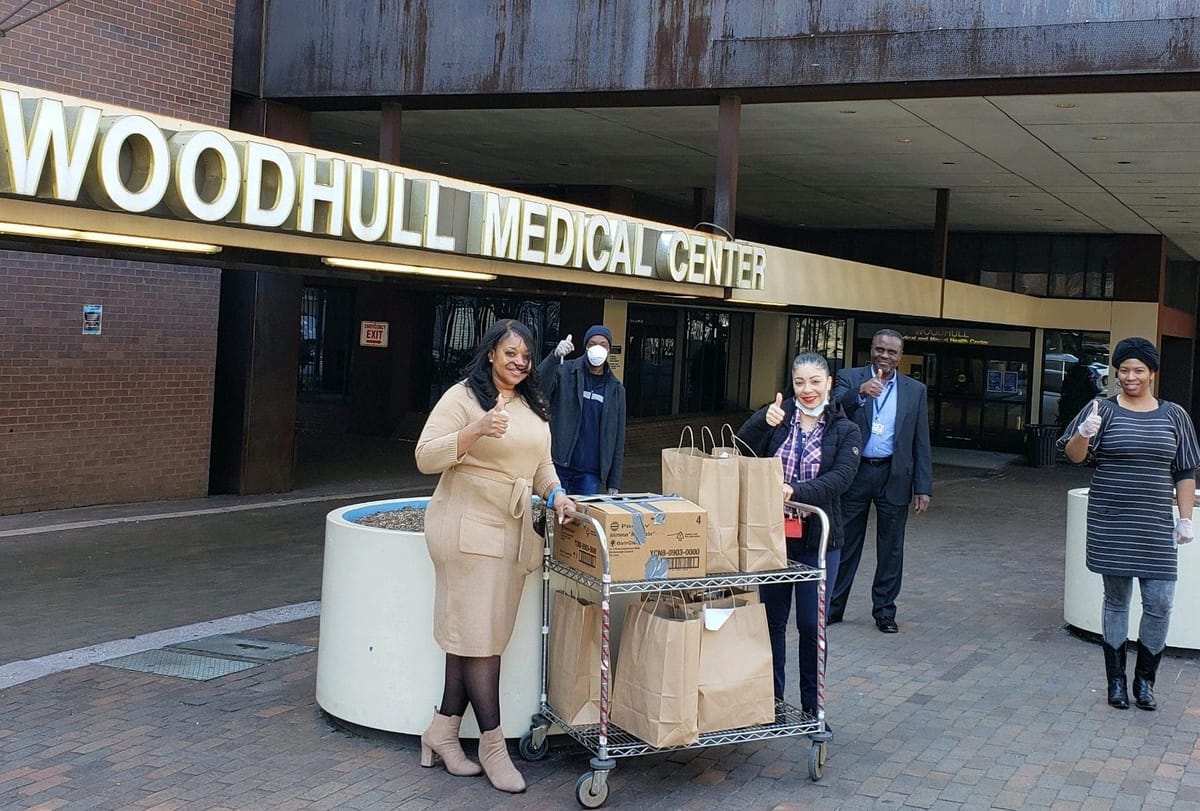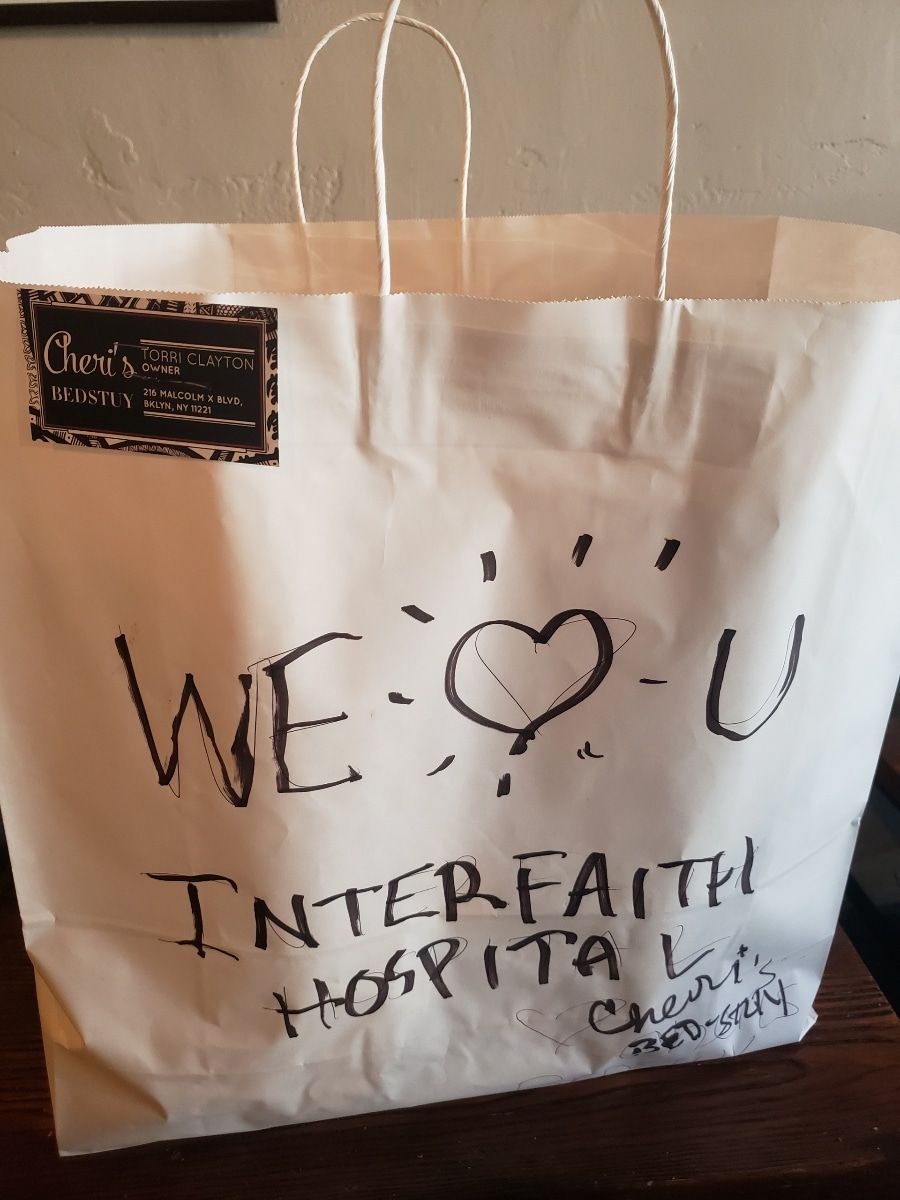Feeding Neighbors, Keeping Restaurants In Business – #REHasYourBack Connects


Seth Weissman, a Brooklyn building owner and the founder of Urban Standard Capital, knew that when this crisis started he had to do something to support his small business tenants and friends. He, along with around fifty other real estate firms, has since donated over 6,000 meals to NYCHA residents, healthcare workers, and food-insecure residents. The project, called #REHasYourBack (Real Estate Has Your Back), started in March and delivers meals five days a week in Brooklyn.
Five restaurants have been involved so far – a mix of Weissman’s tenants and friends, including Cheri’s Bed Stuy, Estia’s Little Kitchen, and Almond Restaurant. “It was a win-win-win,” Weissman told us. “I was able to help the businesses, help their employees [get back to work], and help people get what they need.”
Torri Clayton owns Cheri’s Bed-Stuy, a restaurant already known in the community for charitable giving, and is a tenant of Weissman’s.

“It was just the natural thing to do when you want to provide help. Since we had the restaurant it was really a no-brainer to donate and to partner with organizations that were donating as well, and just exclusively have our restaurant do that for the last couple of months,” Clayton said. Cheri’s is not open to the public for take-out and delivery, but is working with several organizations, including #REHasYourBack, to donate to frontline workers.“This came on board pretty early so we were fortunate enough to not have to lay off the staff. They had a hiatus for at least two weeks and then this came into play,” Clayton said. “In fact, we actually brought an additional two workers on.”
New York City has made a pledge to feed all of the seniors in NYCHA housing, but Weissman says that this occasionally falls short. #REHasYourBack has been working especially with the Vernon Houses, a NYCHA development where 230 units have been without working stoves since March.
“The tenants association told us that [the meals that they were receiving] were more like snacks than nutritious, balanced meals,” Weissman said of the Vernon Houses. “They have been particularly appreciative of [the fact] that [what we’re offering is] not potato chips, it’s a full meal.”
Denene Witherspoon, the President of the 303 Vernon Avenue Tenants Association, thanked him on Facebook – “I woke up with joy in my heart because we have been blessed to have Seth Weissman in our lives. He has made it possible to have hot meals for our residents at 303 Vernon Avenue when NYCHA [and] the mayor didn’t. Words cannot express how grateful I am for your act of kindness”.
Weissman says that the city allows $4 or $5 per meal, a number we have been unable to confirm – the Assistant Commissioner for Public Affairs and the NYC Department of Sanitation, Joshua Goodman, would not share the cost number.
“I am referring you to the detailed plan we have published on how we will feed all New Yorkers in need, which you can read at the link I’ve provided,” he responded in an email. “The key point here is that we’re distributing nearly a million meals per day, and will continue to do even more to meet all the need, whatever it takes.” The plan provides no information on budget or cost per meal.
#REHasYouBack allows an $8 budget per meal.

“We want to support the small businesses, but we wanted to pay people a fair wage so that they can hire people and bring people back as soon as possible,” Weissman said. “We wanted to be able to do more proteins and fish and chicken and vegetables that were particularly important for senior residents of the NYCHA houses, and an 8$ budget allowed us to meet all those objectives.”
According to Weissman, the project would not have been possible without the other real estate firms and community leaders involved, including Andy J. Marte, State Senate candidate for the 18th District and community organizer, and Henry Butler, State Committeeman and District Leader for the 56th District.
“We filled out applications for small business funding [but] the money was gone before it even started,” Clayton said. “We were really one of the fortunate ones that had this opportunity happen in the midst of us doing our own charitable effort. It was just such a group effort from our community. It was just such a loving, supportive [environment with] everyone on the same page, just wanting to reach out to these frontline workers.”
“I didn’t really have an anticipation of what the need would be. We’ve really relied on the community leaders that we’ve partnered with for the distribution,” Weissman said. “[We’ve brought] out more than 50 real estate firms to support this effort, every firm that I’ve asked has said yes and contributed. That’s the universal nature of the impact of this situation.”
While Weissman is typically more behind the scenes, he has been on several distributions for the project, and has spoken to residents who have told him how grateful they are, and that they never thought that they’d be in a position where they needed assistance like this.
“That’s something that has really resonated. The depth of this situation has hit a lot of people who previously wouldn’t have needed to be the recipient of free meals,” Weissman said.




